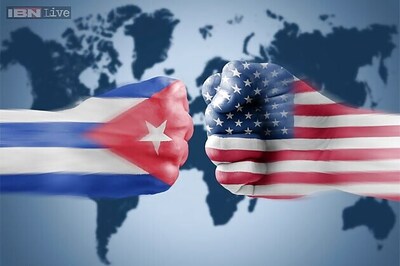
views
Come Saturday, and India will wake up to its 69th Independence Day. Most will agree that even after years of gaining Independence, the remnants of us being engulfed with barriers and stereotypes, exist. The frequent breakthroughs however have the quality of restoring our faith in the whole system and starting afresh. For us Indians, these breakthroughs are often meted out through Bollywood.
We bring to you a list of movies which spoke about the different types of Independence we need in our lives.
English Vinglish: It's funny how most of us choose to believe that the west has an upper-hand. Sridevi in 'English Vinglish' was mocked for below-average English speaking skills, which made her enroll in an English improvement course. During the course, Sridevi comes to realise that love and affection are universal and language is just a medium. Sridevi's potrayal of Shashi in the movie teaches us how retaining ones' values and family is more important than a language. Freedom from inferiority complex due to one’s language was brilliantly put forth through Sridevis's character.

Margarita With A Straw: The movie had more than one connotations of freedom. The character of Laila played by Kalki Koelchin falls in love with Shanum (Sayani Gupta) a fiery activist who is blind. This emotional movie took down the stereotypical notions we have about homosexuality and bisexuality and explored the idea of accepting people for what they are.

Masaan: At the beginning of 'Masaan' the character of Devi played by Richa Chadha is "caught" in a hotel room with a friend, engaging in "indecent behaviour". Through the length of the movie, Devi stood by her decision of checking in the hotel room and retained her notions about sexual freedom.

Bajrangi Bhaijaan: The character of Rasika (Kareena Kapoor Khan) made Pawan (Salman Khan) see sense when he was evidently inclined towards rejecting Munni due to her Pakistani roots. Rasika taught how we need freedom from the shackles of religious intolerance.

Dum Laga Ke Haisha/ NH10: The leading ladies of the mentioned movies were instrumental in breaking the stereotypes that surround women. The two women take the strings of their lives in their own hands and refuse to give in to the societal notions held by the society regarding weight and honour killings.

Two States: Arjun Kapoor-Alia Bhatt starrer taught us how it is possible for two completely diverse cultures to co-exist. After the initial clashes, the families of Arjun and Alia ultimately give in and decide that love is more important than religion.

Aarakshan/3 Idiots/Udaan: The movies touched different aspects of education in the country. While 'Arakshan' explored the issue of caste based reservations and how they were unfair in some cases, '3 Idiots' and ' Udaan' in their own ways depicted the importance of following your own heart and not submitting to the traditional education system which hinders your individuality.

Chak De! India: This Shah Rukh Khan starrer imbibed in us the importance of remaining united even after being diverse. The coach of the Indian Women Hockey team, Kabir Khan (Shah Rukh Khan) strives towards uniting his team members as Indians and not separate entities belonging to different ethnicities. The team ultimately goes on to win the Hockey World Cup.

Oh My God/PK: The two movies spoke about religion, and the existence of godmen and godwomen. Through 'Oh My God' and 'PK' the message of attaining freedom from religious frauds is made loud and clear.

Iqbal/ Taare Zameen Par: 'Iqbal' and 'Taare Zameen Par' are two movies which taught us that everyone, with or without a disability, is special. The two movies had their protagonists as people who suffer from some form of disability or another but who nevertheless go on to prove their mettle in their respective fields of expertise.

Lagaan: The Oscar-nominated movie highlighted the issue of caste tolerance and how one should overcome it in order to give place for talent to flourish. The character of Kachra in the movie is a talented bowler who belongs to a lower caste and is looked down upon. Ultimately, the folks around him recognise his talent and he proves to be instrumental in India's win against Britishers.

Kya Kehna: In one of her most memorable roles, Preity Zinta plays the role of a woman who becomes pregnant before marriage. Her decision of keeping her child faces a lot of protest from her family members but she stands by it and does not give up. The taboo surrounding pre-marital pregnancy is addressed in the movie.

My Brother Nikhil/ Phir Milenge: The two movies address the sensitive topic of HIV in their own regards. How the protagonists of the two movies address the stigma associated with AIDS is what the crux is. 'My Brother Nikhil' and 'Phir Milenge' teach us how we should free our minds from the false notions that surround AIDS.

















Comments
0 comment